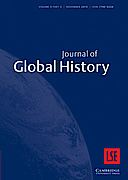New release: ‘Even in the remotest corners of the world’: globalized piracy and international law, 1500–1900. By Michael Kempe
1. November 2010
In: Journal of Global History, 5 (2010), 353-372.
Zitation
As a phenomenon accompanying European expansion, piracy and privateering spread globally, beginning in the sixteenth century. These activities, and their handling within transnational relations, shed light on several issues of modern international law, then under formation. They reflect different basic problems that both challenged and structured central aspects of legal relations on an international level: the transformation of ocean spaces into areas of colliding legal strategies, the use of privateers (‘legalized’ pirates) as a tool for extraterritorial expansion, the involvement of non-state players in international legal relations, the fragmentation of maritime sovereignty, and the application of international law to criminalize political resistance as piracy.
That said, the international management of piracy shows that international law had the potential to resist its abuse as a mere instrument of politics and special interests. By focusing on piracy and privateering in early modern times, this article suggests a tension within modern international law, between its instrumentalization by particular interests and its status as an independent normative authority to correct or regulate such interests. (abstract)
Dr. Michael Kempe ist scientific coordinator of the Ph.D. program “Cultures of Time.”
